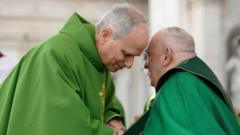Cardinal Robert Francis Prevost, now Pope Leo XIV, invokes the legacy of Pope Leo XIII to guide the Catholic Church in contemporary times.
Pope Leo XIV: A Name with Historical Significance

Pope Leo XIV: A Name with Historical Significance
The selection of Pope Leo XIV honors past teachings while signaling a commitment to modern issues.
May 8, 2025, 9:41 p.m. ET – As the world pivots towards a new era under the leadership of Pope Leo XIV, a substantial emphasis has been placed on the historical implications of his name. Matteo Bruni, a Vatican spokesperson, disclosed that Cardinal Prevost's choice reflects a conscious nod to his namesake, Pope Leo XIII, who notably guided the Church through an evolving socio-political landscape from 1878 to 1903.
Pope Leo XIII, often referred to as the “pope of the workers,” took significant strides to advocate for labor rights, earning his place in history with the publication of the encyclical “Rerum Novarum.” In this 1891 document, he championed the needs of the working class, and argued for a fair living wage amidst growing industrial unrest and the rise of socialism. This moment in Church history exemplified a vital shift, as Leo XIII urged for a harmonized relationship between labor and capital.
Experts suggest that the selection of the name Leo XIV seeks to bridge the past with the Church's ongoing aspirations. David I. Kertzer, a Brown University professor, compares Leo XIII's role as a mediator—a transitional figure who engaged with both pre-modern and modern challenges—essentially marking a path for today’s Pope Leo XIV. “It reflects a moderate approach, while still pursuing the outreach to the underprivileged,” Kertzer explained.
In parallel, Robert Orsi, a Northwestern University historian, views this name as an opportunity for Pope Leo XIV to seize the momentum of contemporary socio-economic discussions, encouraging an active involvement in current issues, much like his predecessor.
In essence, Pope Leo XIV’s papacy might encapsulate a recognition of past struggles while tactically addressing the pressing challenges that lie ahead—a trajectory destined to shape the modern Catholic Church.
Pope Leo XIII, often referred to as the “pope of the workers,” took significant strides to advocate for labor rights, earning his place in history with the publication of the encyclical “Rerum Novarum.” In this 1891 document, he championed the needs of the working class, and argued for a fair living wage amidst growing industrial unrest and the rise of socialism. This moment in Church history exemplified a vital shift, as Leo XIII urged for a harmonized relationship between labor and capital.
Experts suggest that the selection of the name Leo XIV seeks to bridge the past with the Church's ongoing aspirations. David I. Kertzer, a Brown University professor, compares Leo XIII's role as a mediator—a transitional figure who engaged with both pre-modern and modern challenges—essentially marking a path for today’s Pope Leo XIV. “It reflects a moderate approach, while still pursuing the outreach to the underprivileged,” Kertzer explained.
In parallel, Robert Orsi, a Northwestern University historian, views this name as an opportunity for Pope Leo XIV to seize the momentum of contemporary socio-economic discussions, encouraging an active involvement in current issues, much like his predecessor.
In essence, Pope Leo XIV’s papacy might encapsulate a recognition of past struggles while tactically addressing the pressing challenges that lie ahead—a trajectory destined to shape the modern Catholic Church.



















